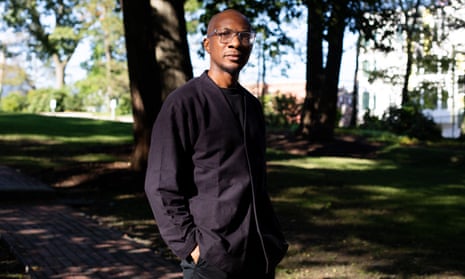 |
| Intellectual agility … Teju Cole. Photograph: Kayana Szymczak |
Cole’s third novel packs in centuries of artworks and continents of human experiences, in a dazzling reflection on colonialism, aesthetics and contemporary life
Kit Fan
Friday 20 October 2023
A
Tunde, a Nigeria-born Harvard professor of photography, walks into an antiques shop in Maine and sees “an assortment of wooden masks and sculptures, three recognisably African”. He notices “a small photocopied note” about a colonial estate being “attacked by Indians” and later reclaimed by the Wells family. As Tunde’s mind excavates the complex colonial history, he links Bach’s Cello Suites with the cowboy epic The Searchers, starring John Wayne as a civil war veteran; the Micronesian navigator Pius Mau Piailug’s non-instrument wayfinding skills with the Hollywood blockbuster Ad Astra. These connections are not random and ask us to rethink the hierarchy of fine and popular art, the centrality of western aesthetic values, and the problematic representation of truth and history.
Published 12 years after his second novel Open City, Tremor works as a labyrinthine history puzzle, a personal collage of memorable artworks, a photo-essay about lives and struggles in Lagos, and a spellbinding lecture on racism, provenance, decolonisation and restitution. At its heart is a deeply moving encounter between Tunde and his partner Sadoko as they drift in and out of each other’s lives. Through the couple’s painful silences and yearning for physical touch, Cole examines the meaning of separation and intimacy, time and mortality, and the many tremulous moments that life triggers in us.
How can a novel contain so many genres and so much information without being showy? Cole’s prose has a calm, meditative voice that moves forward unobtrusively, as if the narrator only serves and observes, never directs. It has a hypnotic, transportive quality, an intellectual agility more akin to muscle memory than free association.
Just as a madeleine can transport Proust’s narrator to a different time, place and self, an ose dudu is one of many keys that open memory’s door for Cole. No ordinary African black soap, the ose dudu in Tremor is part of the Nigerian artist Otobong Nkanga’s art project exploring “commerce, craft, installation, sculpture, performance, and activism”. Profit from it helps build an art foundation in Nkanga’s ancestral home. As Tunde takes a shower, the scent of ose dudu transports him back to his childhood in Ojodu, Lagos – the dust and grit that “became part of his life” under a military dictatorship and the houseboy who died of lung disease. Through Tunde’s restless memory, Cole reveals the deep-seated cause and effect of our actions and inactions and puts a spotlight on Nkanga’s art and activism, with the power to address and redress history, and create a future for the local community.
At 256 pages, Tremor packs in centuries of artworks and continents of human experiences. It’s macro in its scope but focused in its exploration of brutality and justice. One of the many highlights is the bone-chilling lecture Tunde gives on the Benin bronzes, reflecting on the 1897 massacre by the British army, who “descended on Benin like hellfire and began killing right away”. Tunde contextualises the 15th-century Nigerian artistry beside Turner’s Slavers Throwing Overboard the Dead and Dying and the Flemish master Herri met de Bles’s mysterious Landscape With Burning City. “We have not been concurrently taught to value the life-worlds of others, their autonomy, their ancestral rights,” Tunde observes, “but of late I have begun to experience the museum itself as a zone of sustained shocks … a feeling of moral whiplash.”
Midway through Tremor, Tunde travels to Nigeria and takes us to Lagos neighbourhoods where sustained shocks of poverty, crime and institutional corruption go cheek by jowl with acts of kindness and entrepreneurialism – a driver caught up in a property dispute, an artist painting critically endangered animals, a teacher creating a school for the deaf. Like Tunde, Cole is a fine photographer, and published an earlier photobook, Blind Spot. In Tremor he curates a masterclass in flash fiction portraitures and creates a buzzing Nigerian metropolis full of risk and allure.
Although highly conceptual, Tremor is heartbreakingly tender. The trials and tribulations of Tunde and Sadoko keep us on edge. Despite the word “tremor” never appearing in the novel, Cole sustains a sense of the tremulous agitation and excitement between them and among their friends (we hear one friend died years ago; another may soon if chemotherapy fails). While reading, I felt driven to explore the paintings, songs and historical references interwoven with their lives. “The future is a series of ever less clear tomorrows,” Tunde says, and this is a book that widens and unsettles the horizons of our 21st-century experience, with a vivid sense of the earth-shaking tremors under the surface of our shared lives and cultures.
Kit Fan’s first novel is Diamond Hill. Tremor by Teju Cole is published by Faber (£18.99).


No comments:
Post a Comment